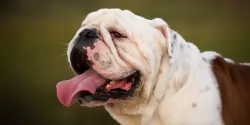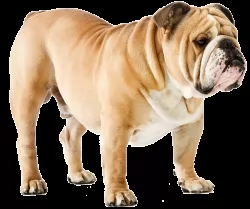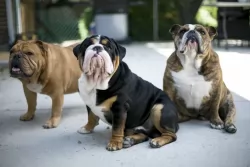 MyDogBreeds
MyDogBreeds Puli is originated from Hungary but English Bulldog is originated from United Kingdom. Both Puli and English Bulldog are having almost same height. Puli may weigh 12 kg / 26 pounds lesser than English Bulldog. Puli may live 3 years more than English Bulldog. Both Puli and English Bulldog has almost same litter size. Puli requires High maintenance. But English Bulldog requires Low maintenance
Puli is originated from Hungary but English Bulldog is originated from United Kingdom. Both Puli and English Bulldog are having almost same height. Puli may weigh 12 kg / 26 pounds lesser than English Bulldog. Puli may live 3 years more than English Bulldog. Both Puli and English Bulldog has almost same litter size. Puli requires High maintenance. But English Bulldog requires Low maintenance
 The Puli’s history is ancient, going back about 2,000 years. It is believed that Sumerians used Puli-type dogs to herd sheep thousands of years ago.
The Puli’s history is ancient, going back about 2,000 years. It is believed that Sumerians used Puli-type dogs to herd sheep thousands of years ago.
Ancient excavations show signs of Puli dogs. It is believed that Magyar tribesmen brought Pulis to Hungary for their herding abilities. The Puli was registered by the American Kennel Club in 1936, and the Puli Club of America was formed in 1951.
 At earlier time English Bulldogs were not as it was now. They were taller and was fierce in their nature. They were completely developed in England.The first breed was set in at about 1500. After that they were involved in a game called Bull baiting in England, where a fight was set in between a Bull and the Bulldog.
At earlier time English Bulldogs were not as it was now. They were taller and was fierce in their nature. They were completely developed in England.The first breed was set in at about 1500. After that they were involved in a game called Bull baiting in England, where a fight was set in between a Bull and the Bulldog.
English Bulldogs will be on full fierce by biting and holding the bull even when they jump or struggle, until they fall on the ground. After that Bull baiting was banned in England, and everyone thought Bulldog will disappear. But some breeders re engineered it and made it as it was now. In 1950s Bulldogs ranked among top 10 in America.
 The Puli is a medium sized dog from Hungary standing at between 36 an 45cm in height and weighing 10 to 13kg. He has always been a herding dog and his long,corded coat has been his trademark.
The Puli is a medium sized dog from Hungary standing at between 36 an 45cm in height and weighing 10 to 13kg. He has always been a herding dog and his long,corded coat has been his trademark.
The color of the coat can be black, white or cream but black is the color most seen with the Puli. The dog may well be a low shedder, but the coat is still going to need a lot of maintenance to keep it looking reasonable. It gets longer and longer and will need to be groomed to keep the cords neat and clean.
The Puli is an intelligent dog and it can be trained to respond to some simple commands. If the dog gets enough exercise, he can adapt to life in the country or in the city. As a herding dog he is used to being busy and will need walks, a run off his leash in the park and ball games.
They get on well with children and with other pets and are loyal to their owners and wary of strangers. They are highly active dogs these, and they just love playing games throughout their adult lives.
Because they are dogs which need a lot of exercise and space, they are more suited to life in the countryside as opposed to life on a small property in the city. They also make good faithful family guardians.
 English Bulldogs are muscular in nature. They easily gain over weight and so exercising them is very mandatory. They are well suitable for apartment living, since they will always like to lie down and sleep. They will woke up only for their food. But they are very much faithful for their owners and it will be seen very loving when they come near and look at you.
English Bulldogs are muscular in nature. They easily gain over weight and so exercising them is very mandatory. They are well suitable for apartment living, since they will always like to lie down and sleep. They will woke up only for their food. But they are very much faithful for their owners and it will be seen very loving when they come near and look at you.
Since they face respiratory problems they should not be compelled to play for very long time. Their look may be ferocious but they are very calm and loving towards others unless you do any harm to them or their owners.
 Your Puli is a self-confident, strong willed dog that is intelligent and can learn to be obedient and well mannered. They are also social and playful, and will love to be a family pet, being prepared to provide friendship and loyalty.
Your Puli is a self-confident, strong willed dog that is intelligent and can learn to be obedient and well mannered. They are also social and playful, and will love to be a family pet, being prepared to provide friendship and loyalty.
Because he has always been a herding dog, he takes his role of guardian and protector of his human family seriously. He makes a splendid pet if you’re ready to tackle the long coat which makes sure he doesn’t fit into the low-maintenance category.
 They are good companion for children, but it is recommended to have an adult supervision and not allowing them alone.
They are good companion for children, but it is recommended to have an adult supervision and not allowing them alone.
They are the best companion dogs. They take decisions after thinking for a while. They are very faithful for their owners, and if anybody does harm to their owners infront of them, then they will show their full energy and teach a lesson to them.
They adapt well for apartment living. They can be leaved alone in home for some hours but they love to stay with anyone in the house. English Bulldog love to live in moderate weather, both hot and cold weather will bring problems to them.
Bulldog will not do all things you order them, as they think well and take their decision well. They think what will they get by doing what you say, and then only they will do it.
 Joints, eyes, and skin problems can cause problems with the Puli dog. Hip dysplasia is a problem with many dogs that can cause pain and also lameness.
Joints, eyes, and skin problems can cause problems with the Puli dog. Hip dysplasia is a problem with many dogs that can cause pain and also lameness.
Check your pet over with grooming sessions and make sure both the ears and eyes are free of discharge and redness.
The coat is thick and the Puli will require you to watch his skin for bacterial infections which can be caused by a lot of itching and scratching. Other common canine health issues to look out for are cancer and bloat.
 They have chances of getting problems due to brachycephalic syndrome, this is because of their short face. Also they suffer from respiratory problems. Bone and joint problems are also common in them.
They have chances of getting problems due to brachycephalic syndrome, this is because of their short face. Also they suffer from respiratory problems. Bone and joint problems are also common in them.
English Bulldog has chances of getting skin problems and hair fall is the initial for those skin problems. Normally they shed hair upto a considerable level.
 Training and socialization is important for any dog and not just the Puli. Well trained dogs are a joy to have around – they are obedient and well mannered. The Puli is intelligent enough for you to train him yourself or you can have a professional trainer do it for you.
Training and socialization is important for any dog and not just the Puli. Well trained dogs are a joy to have around – they are obedient and well mannered. The Puli is intelligent enough for you to train him yourself or you can have a professional trainer do it for you.
The Puli is an athletic dog but you don’t want to start with any strenuous exercise with a young dog less than a year of age. Take your young dog for walks and give him some ball games. Only start more strenuous exercise later on to spare unnecessary pressure on the joints which could lead to hip dysplasia later on.
Every dog needs to be brushed and groomed to ensure its health. A dog like the Puli will need additional grooming because of the long dreadlocks for a coat. Many Puli owners prefer to have the hair cut short.
The coat of the Puli luckily doesn’t shed much but the coat, if you keep it long, will require a special wide tooth comb. You’ll need to check inside his ears, check that his eyes are bright without any discharge and also trim his nails.
You will have to check inside his mouth too. He can’t tell you if he has a rotten tooth that is painful and causing him to be sick. You need to regularly check his teeth.
It is important to know how much to feed your Puli. A healthy diet is so important for good health and a long life. All dogs have different appetites depending on their age, their breed, their size, the season of life they’re in and their activity levels.
It is better to feed your dog twice a day as opposed to one meal a day to avoid life threatening illnesses such as bloat. There are excellent commercially manufactured dog foods, but also bad ones, so you want to make sure that the kibble you choose is a high quality one with lots of vitamins and minerals.
You want to give him some home-made food too, keeping it simple and uncomplicated – the way dogs like it. Boiled chicken, brown rice or pasta and spinach, sweet potatoes and carrots are a healthy choice for your pet.
Chop it up and add it into the dry kibble a couple of times a week. Some raw meat added in from time to time will contribute to him being healthy. Never leave him without a constant source of fresh, cool water.
 English Bulldog puppy needs more energy and nutrients for its growth, so they must be fed several times a day but the amount should be less. They should not be given raw meat and foods that may be gone bad. The food given to puppy should be allowed to eat for only 20 minutes. After that time if balance food remains in bowl they should be removed and for the next meal new food should be given.
English Bulldog puppy needs more energy and nutrients for its growth, so they must be fed several times a day but the amount should be less. They should not be given raw meat and foods that may be gone bad. The food given to puppy should be allowed to eat for only 20 minutes. After that time if balance food remains in bowl they should be removed and for the next meal new food should be given.
The puppy shall be given cooked food which we eat and it is preferable to give cooked meat and bones three times a week. Salt should be added less for them and sugar should not be given.
The bulldog can be fed 1 to 2 times per day, that is morning and evening. It is not recommended to give them soybean oil, chocolates and onions. Kibbles can also be given to them.
Nutritional food is the main factor for their health and the vaccinations should be made at the right time with consulting the veterinarian.
English Bulldogs may have less energy, but they love to play. They can be made to chase after a ball or Frisbee. But short chasing will be good for them. They should not be made to play in hot sun as they suffer with some heat problems. Also they are interested in playing Tug of war, Hide and seek and solving puzzles.